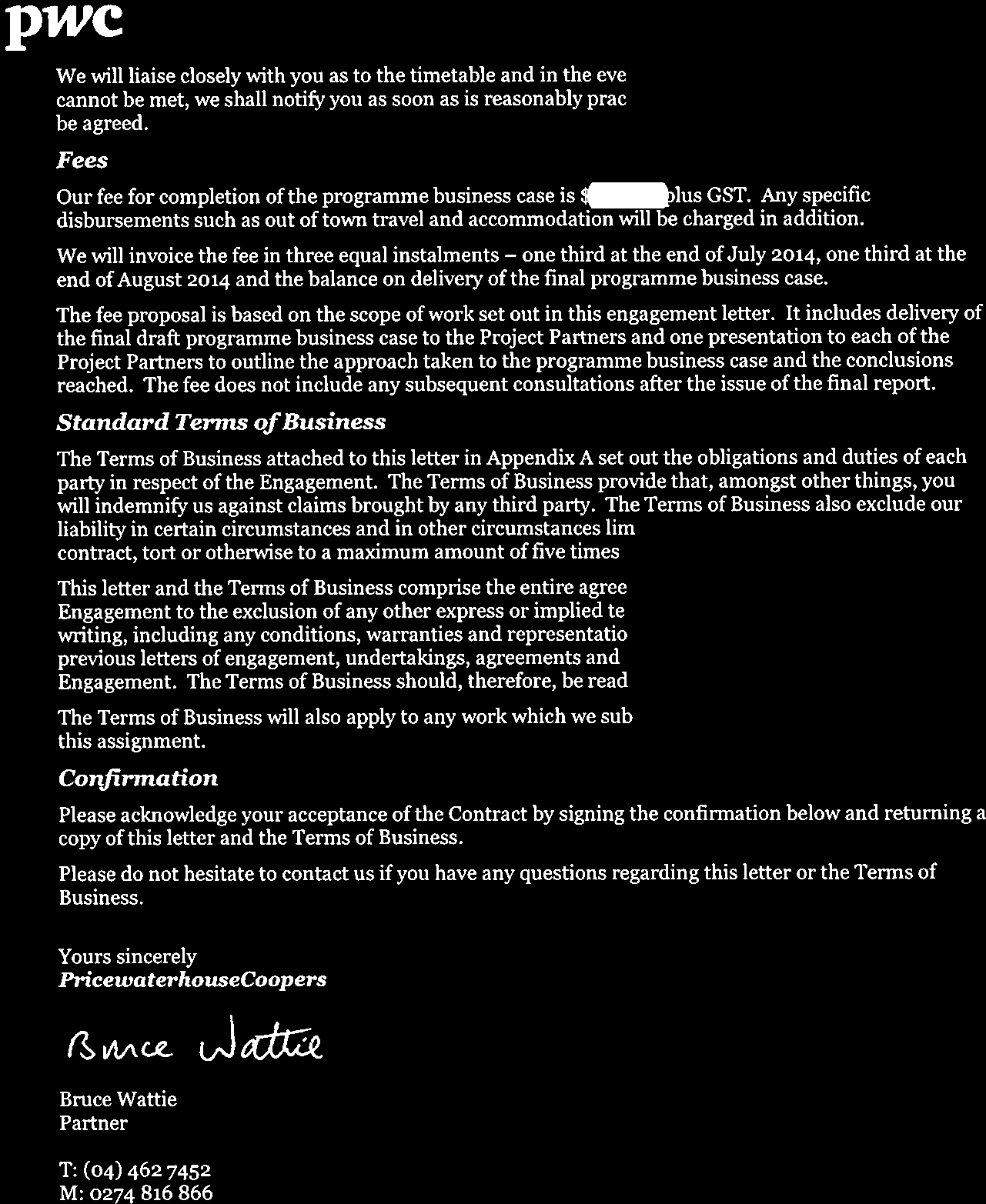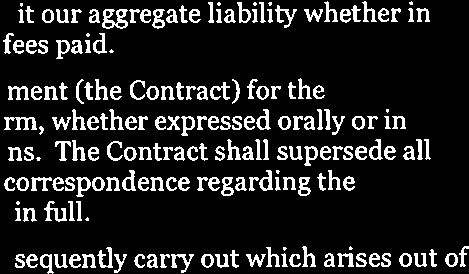 Private & Confidential
Private & Confidential
Luke Troy
Manager, Corporate Planning
Greater Wellington Regional Council
PO Box 11646
WELLINGTON 6142
By Email:
16 July 2014
Engagement letter for Bus Rapid Transit programme business case
Dear Luke
Introduction
This letter confirms that we have been engaged by the Greater Wellington Regional Council (“the
Council” or “Greater Wellington”) on behalf of itself, the New Zealand Transport Agency and the
Wellington City Council (together “the Project Partners”) to provide the services (“the Services”) set
out below.
This letter outlines the Services to be provided, the timetable, personnel involved, our fee basis and
Terms of Business.
Background and Purpose
The recently completed Wellington PT Spine Study (“the PTSS”) evolved as a recommendation of the
earlier Ngauranga to Airport corridor study. The PTSS identified transport projects that would
support the on-going development of Wellington’s growth spine (covering the area between the
Wellington railway station and Wellington Hospital, including the CBD), while also being
complimentary to the planned improvements to the city’s strategic road network.
The PTSS concluded that Bus Rapid Transit (“BRT”) was the preferred option from a short-list of three
seriously considered transport options (the other two included bus priority and light rail transit
systems). The PTSS concluded that implementing a BRT system within the study area would yield the
best mix of costs and benefits, expressed as BRT having the highest benefit to cost ratio (BCR).
The PTSS indicated that BRT could be delivered as single large project or as a series of smaller project
components. Therefore, a programme business case is needed to identify the preferred way to deliver
BRT (“the Project”), between the extremes of a number of smaller projects and one large overall
project. In this regard the programme business case:
Is the next step required in the process of converting the findings of the PTSS into an
actionable sequence of projects and so enable the Project to progress beyond the early
planning stages and onto more detailed consideration of the preferred option.
Must make the case for investment in the Project by the Project Partners.
Should provide a basis for attracting finance for the Project from funders in addition to the
Project Partners.
PricewaterhouseCoopers, 113 – 119 The Terrace, PO Box 243, Wellington 6140, New Zealand
T: +64 (4)462 7000, www.pwc.co.nz
 Luke Troy
16 July 2014
Scope of services
Luke Troy
16 July 2014
Scope of services
You have requested our assistance in completing the programme business case. Our role will be to
compile the programme business case from existing elements of work that have already been
undertaken as well as developing material for the business case, particularly in relation to economic
benefits and costs. We will be responsible for the delivery of the overall programme business case,
including incorporating the inputs from the other contributors and developing a programme for
investing in the project(s).
Inputs from the Project Partners will include, but not be limited to developing:
The strategic and organisation context inputs from work completed to date.
The sequence of activities needed to deliver the BRT. This will be based on work completed
for the PTSS.
We will deliver the programme business case using the Treasury’s business case approach, augmented
by additional, more stringent requirements of the NZTA, which are transport investment specific. The
following is a brief description of the sections (cases) of the programme business case. A more detailed
description of the content of the cases in presented in Appendix B.
Strategic case
Identify the strategic regional context for the project
Clarify the project investment objectives, existing investment circumstances (including the
scheduling and timing of other strategic transport investments) and therefore the derived
regional needs from the suite of projects, including BRT.
Outline the potential business scope and service requirements, including discussion of the
benefits, risks, constraints and dependencies, that the options must satisfy to cross the
evaluation hurdles.
Discuss how, based on the above, the long-list of transport options was narrowed to the short
list investigated in the PTSS.
Economic case
Explanation of the short-listed options.
The evaluation of the short-list to determine a preferred option using multi-criteria analysis,
project NPV and benefit-cost analysis (including project BCRs).
Confirmation of BRT as the preferred way forward.
Elaboration of the counterfactual (“if you don’t do this, the city will have to …”)
Description of other benefits that could be either quantified or expressed qualitatively that
reinforce the economics underpinning the preferred option:
Discussion on the optimal method of delivering the project – either as a single large project
(possibly with stages) versus splitting the option into multiple smaller projects
Optimisation of project delivery on an economic basis by looking at sequencing and timing
either across stages or multiple projects.
Commercial case
Based on the preferred BRT option and the Alternative Funding Options Study, conduct an initial
assessment of the best way of delivering the project through procurement, including the likely
attractiveness of the project to potential service providers, depending on whether the project is a single
large project or split into several smaller ones:
PwC
Page 2 of 9
 Luke Troy
16 July 2014
Luke Troy
16 July 2014
Outline of private financing opportunities and their applicability to the BRT.
Consideration of whether competition can be created by contracting for separate components
or parts of the project, or is the best mechanism delivery by a single supplier (including
consortium)?
Discussion on the recommended procurement approaches and the conditions under which
these will be favourable.
Next steps in terms of determining the best way forward for procurement.
Financial case
An initial assessment of the affordability of delivering the preferred BRT option as either a single large
project or as multiple smaller ones. The financial case will need iterating with the economic case to
determine the optimal financial outcome that also attempts to maximise the economic benefits
associated with the project.
The Financial Case will also include the preliminary cash flows (based on available cost estimates) for
the project sequencing. In particular, the PBC will identify the major capital components across the
project lifecycle where additional funding may be required. This will enable the programme business
case to feed into key documents and planning processes, including the LTP, RLTP and NLTP.
Management case
An initial assessment of the capacity and capability of each of the partner organisations to implement
the preferred option and preferred approach.
Reliance on information, restrictions and disclosure
We will use historical and forecast information provided by the Project Partners but will not audit or
verify this information. We will not therefore accept any responsibility for any errors contained in the
information provided to us.
We understand that the programme business case may be made available to a range of stakeholders in
the BRT. Our responsibility for producing the programme business case will be to Greater Wellington
only, as the party that is engaging us and is the signatory to this engagement letter. We will not accept
responsibility to any party other than Greater Wellington in respect of our work in preparing the
programme business case and we will not accept responsibility to any party if our work is used by any
party including Greater Wellington in breach of the terms of this letter.
Personnel
I will be the Partner responsible for this assignment, assisted by Chris Money and analyst resources as
required. Hamiora Bowkett will be the quality review partner.
Timetable
We will endeavour to provide you with a full draft of the programme business case by no later than 15
September 2014. Where appropriate we may release sections of the business case to you for review
before releasing the entire draft.
We will need to work closely with the Project Partners to obtain information and to discuss the
information and solicit views about issues arising during the development of the various sections of the
programme business case. Also, as noted, the Project Partners will be providing specific input to the
programme business case. Our ability to deliver a programme business case within the time frame
required and to the quality standard needed will depend heavily on the Project Partners providing
input and assistance as required.
PwC
Page 3 of 9







 Luke Troy
16 July 2014
Acknowledgement and acceptance
Luke Troy
16 July 2014
Acknowledgement and acceptance
I confirm that I have read and accept the above letter and attached terms and conditions on
behalf of Greater Wellington Regional Council.
___________________________
Signed (for Greater Wellington Regional Council)
___________________________
Title/Name
___________________________
Date
PwC
Page 5 of 9
 Appendix A
4.
Disclosure of our work
Appendix A
4.
Disclosure of our work
4.1. The services are provided for your use only and we accept no responsibility
Introduction
or liability to any other person other than those who have engaged us and
to whom we report.
These Terms of Business and the attached engagement letter together form the
4.2. You must not disclose any report or other information provided as part of
entire agreement (the Contract) between the New Zealand Firm of
the services to any other person without our prior written consent.
PricewaterhouseCoopers (PwC) and all addressees of the engagement letter. If
there is any conflict between these terms and the engagement letter, the
4.3. You must not use our name in connection with any prospectus, information
engagement letter will prevail. Unless otherwise agreed in writing, any further
memorandum or other offer or marketing document, whether public or
work we may carry out in connection with this service will be carried out as part
private, without our prior written consent.
of this contract.
5.
Fees and disbursements
1.
Services
5.1. Unless otherwise agreed, our fees are calculated on the basis of time spent
and on the level of skill and responsibility involved in providing the
1.1.
We will provide the services described in the engagement letter (the
services.
services).
(i)
Goods and services tax will be added where applicable.
1.2. You are responsible for determining that the scope of the services is
sufficient to meet your needs.
(ii)
You also agree to pay reasonable professional fees and expenses,
including legal fees and expenses, in complying with or challenging
1.3. Unless specifically stated to the contrary in the engagement letter:
any legally enforceable notice or demand issued by a third party
including any government department or any court or tribunal in
(i)
we may allocate appropriate partners and staff to perform the
relation to or in connection with the services.
services and may replace any personnel named in the engagement
5.2. Our invoices are due for payment upon receipt. If payment is not received
letter with personnel of similar skill;
within 14 days we reserve the right to suspend provision of the services
(ii)
timetabled dates are intended for planning and estimating purposes
and/or charge interest on the outstanding amount at a rate of 3% above the
only and are not contractually binding;
current 90 day bank bill rate.
(iii) the services do not involve an audit or examination conducted in
accordance with New Zealand auditing standards and we will not
5.3. Any fee estimate is given in good faith but is not contractually binding.
express an opinion on any financial statements or information taken
6.
Liability limitation
as a whole, nor provide any opinion on the achievability of
prospective financial information;
6.1. Our liability for any loss or damage that you suffer caused by our breach of
contract, tort (including negligence), breach of fiduciary duty or other
(iv) we will rely on the information that you provide and will not verify
actionable wrong of any kind shall be limited as follows:
that information;
(v)
the services do not include the provision of legal advice or legal due
(i)
we shall have no liability for any consequential or indirect loss or loss
diligence services;
of profit;
(vi) if the services or your reliance on the services depend upon laws,
(ii)
our liability will be reduced to take into account any contributory
regulations or interpretations by the Courts or Government agencies,
negligence on your part pursuant to the Contributory Negligence Act
we are not responsible for any changes in those laws, regulations or
1947;
interpretations (whether or not having retrospective effect) which
(iii) in the event that more than one person caused or contributed towards
occur after the date of our report and are not required to notify you of
your loss, our liability to you will be limited to the proportion of the
such changes;
loss that the Court would apportion to us under section 17 of the Law
(vii) the services are not designed to reveal fraud or misrepresentation.
Reform Act 1936, based on an assessment of our degree of
Accordingly, we do not accept responsibility for detecting fraud or
responsibility and the responsibility of the others who contributed to
misrepresentation whether by directors, management, staff or
the loss (whether or not those other persons are able to meet any
external parties;
liability they may have);
(viii) we are not responsible for the work of any other person who you
(iv) notwithstanding the foregoing, our liability for loss shall in no
engage to perform work in conjunction with our services;
circumstances exceed the amount of 5 times the total fees paid in the
(ix) where the services are for appointment as Statutory Auditor, Receiver
case of non-recurring work or 5 times the annual fees paid in the case
or Liquidator these have the meaning in statute law;
of recurring work (the liability cap) or such other amount specified as
the liability cap in the engagement letter.
(x)
where the words Examination, Compilation, Review, Opinion,
Assurance or Agreed Upon Procedures are used to specify any
6.2. Where there is more than one addressee to the engagement letter, the
services those words have the meanings assigned to them in
amount of our liability as derived from clause 6.1 above is a total limit to be
professional standards issued by either the New Zealand Institute of
allocated between addressees, such allocation being entirely a matter for
Chartered Accountants (now trading as Chartered Accountants
the addressees, who will be under no obligation to inform us of it.
Australia and New Zealand) or the External Reporting Board.
7.
Time limit for claims
2.
Client responsibilities
7.1. No legal proceedings may be commenced later than two years after the date
2.1. You agree that you will:
on which the party bringing the claim became aware or ought reasonably to
have become aware of the facts giving rise to the claim.
(i)
provide, in a timely fashion, all information, assistance and facilities
that we require to enable us to provide the services;
7.2. In any event, no legal proceedings may be commenced more than four
(ii)
provide information that is true, accurate and not misleading;
years after the date on which the facts giving rise to the claim occurred.
(iii) ensure that the collection, retention and dissemination of information
8.
Indemnity
for the purposes of the services complies with the provisions of the
Privacy Act 1993 and with any other legislation governing the use of
8.1. To the maximum extent permitted by law, you agree to indemnify PwC, its
information;
partners and staff, and other PricewaterhouseCoopers firms and their
partners and staff, and to hold each harmless against any liabilities, losses,
(iv) use the results of the services only for the purpose for which the
expenses and other costs, including legal costs and the cost of PwC
services are provided;
professional time reasonably incurred in connection with any claims,
(v)
advise all of our personnel who visit your premises of what is required
inquiries, investigations or similar matters whether made against them or
of them in relation to health and safety in relation to safety
you by any third party arising out of or in any way connected with the
equipment, emergency evacuations, the reporting of accidents and
services.
hazards and other matters.
3.
Reliance on our work
8.2. This clause is for the benefit of the third parties referred to herein and they
may enforce this clause under the Contracts (Privity) Act 1982.
3.1. Our final written report or other final product of the services will identify
the persons to whom the report is addressed. Any oral comments or drafts
of written reports or any other communications made prior to the final
written report or other final product of the services do not represent our
final conclusions and should not be relied upon.
3.2. Our report or other final product of the services should not be relied upon
by management of the addressee of our report, or advisers to the addressee,
in their personal capacities.
PwC
Page 6 of 9
 9.
Contract solely with PwC
14. Circumstances outside the Parties control
9.
Contract solely with PwC
14. Circumstances outside the Parties control
9.1. You agree that in relation to the services and the Contract the client
14.1. Neither party will be liable to the other for any failure to fulfil obligations
relationship is solely with PwC. Accordingly, you agree not to bring a claim
caused by circumstances outside its reasonable control.
of any nature against any partner, employee, contractor or sub-contractor
of PwC or against any other member firm of the global network of
15.
Assignment
PricewaterhouseCoopers firms.
15.1. Neither party may assign, transfer, charge or otherwise deal with its rights
or obligations under the Contract without the prior written consent of the
9.2. This clause is for the benefit of the third parties referred to herein and they
other party, except that each may transfer its respective rights and
may enforce this clause under the Contracts (Privity) Act 1982.
obligations to a partnership or legal entity authorised to take over all or
10. Confidentiality
part of its business.
10.1. Subject to any need to make disclosures required by law or professional
16. Termination of Contract
ethical obligation, both parties agree that information or documents
16.1. The contract may be terminated by either party by written notice.
received by or provided to the other for the purposes of the Contract and
provision of the services, or are marked confidential or are manifestly
16.2. You will pay PwC for all services provided up to the date of termination.
confidential (confidential information) will be treated as confidential,
except if the information:
16.3. Where you terminate the Contract before we have completed the services,
you will pay any additional costs that we incur in connection with the early
(i)
is or becomes generally available to the public other than by a breach
termination.
of the obligations under the Contract,
(ii)
is known to the parties prior to entering into the Contract, or
16.4. The provisions of the Contract which expressly or by implication are
intended to survive its termination or expiry will survive and continue to
(iii) is received from a third party who owes no obligation of confidence in
bind both parties.
respect of the information.
10.2. You agree that PwC may disclose confidential information:
17.
Entire agreement
17.1. The contract forms the entire agreement between the parties.
(i)
for the purpose of providing the services and on a “need to know”
basis, to our personnel (including contractors and sub contractors)
17.2. To the extent permissible by law all warranties, conditions, representations
and other PricewaterhouseCoopers firms involved in the provision of
and liabilities or terms other than those expressly stated are excluded.
the services, and to our insurers or legal advisors;
(ii)
to the Financial Markets Authority, or any party appointed by the
17.3. If any term of the Contract is held to be invalid the enforceability of the
Financial Markets Authority to undertake reviews on its behalf in
remainder of the Contract will not be affected.
relation to quality control reviews performed in accordance with the
18. Resolving disputes
Financial Markets Authority Act 2011, or any quality review
completed by the New Zealand Institute of Chartered Accountants
18.1. The contract is governed by New Zealand law.
(now trading as Chartered Accountants Australia and New Zealand)
18.2. Should any dispute arise, the parties will attempt to resolve it in good faith
as part of its quality review process defined in Rule 20 of the New
by senior level negotiations (this may include mediation using the services
Zealand Institute of Chartered Accountants Rules;
of an agreed mediator).
(iii) once a completed transaction is no longer confidential, we may cite
the performance of the services to clients and prospective clients as
18.3. If the dispute is not resolved through negotiation or mediation the New
an indication of our experience;
Zealand Courts will have exclusive jurisdiction, over all claims that may
(iv) for internal business purposes within the PwC Network;
arise out of or in connection with the Contract.
(v)
if necessary to meet any legal request from a New Zealand or overseas
18.4. Each party hereby irrevocably waives any claim that an action is brought in
governmental agency.
an inconvenient forum, or that the New Zealand Courts do not have
11.
Ownership and destruction of working papers
jurisdiction.
11.1. The working papers that we produce in the course of performing the
19. Sub-contractors selected by you
services are our property and we have no obligation to disclose our working
papers to you or to any other person.
19.1. Where you are using third parties in connection with the Services to be
provided in accordance with this Contract, you will ensure that you have
11.2. You acknowledge that we may, after a period of time, destroy our working
appropriate agreements with them. Unless agreed otherwise in the
papers, reports and other records relating to the services, including any of
Engagement Letter, you will be responsible for the management of those
your documents that have come into our possession, in accordance with our
third parties and the quality of their input and work.
standard procedures relating to document retention.
19.2. Where you require PwC to contract the services of a sub-contractor
12.
Intellectual property rights
specified by you, you will accept responsibility for the work to be performed
12.1. Intellectual property rights in all documentation, systems, materials,
by such sub-contractor. PwC will not be responsible or liable to you or to
methodologies and processes (tools) brought to and utilised by PwC in
any other person for the work performed by, or for any act, omission,
relation to the services or created in the course of providing the services,
default or neglect of, such sub-contractor. In the above circumstances, you
and in all working papers and reports, remain vested in PwC.
will be responsible and liable for, and will indemnify PwC against and from,
any liability which PwC may incur to any person and against all claims,
12.2. Subject to the requirement to treat confidential information as confidential
demands, proceedings, damages, losses, costs and expenses made against,
any spreadsheet, database, system, technique, methodology, idea, concept,
suffered or incurred by PwC, directly or indirectly as a result of or in
information or know - how developed in the course of the Contract may be
connection with the work performed by any such sub-contractor.
used in any way we deem appropriate, including by or for our clients,
without any obligation to account to you.
20. Employment
20.1. During the term of this Contract or within 12 months of its termination or
12.3. In the case of documentation or software prepared by PwC for you we may,
completion, neither party will directly or indirectly solicit for employment
on termination or completion of the Contract, retain one copy of such
any of the other party's employees who have been providing Services or
information as a professional record of our involvement.
otherwise connected with this Contract without the other party's prior
written consent.
13.
Other Engagements
13.1. Nothing in this contract prevents PwC from providing services to other
clients provided that we take reasonable steps to ensure that each client’s
confidential information is not disclosed to other clients.
13.2. This contract is separate from other engagements that we may perform for
you or for other clients and we have no obligation to utilise knowledge
gained from such other engagements when performing the services under
this contract.
13.3. By entering into this contract and providing the services, we do not assume
a responsibility to you in relation to any reports or opinions that we may
have provided under separate engagements, including statutory audit
reports, or in relation to any other work that we may have performed for
any other client, whether or not that client is the subject of the services.
PwC
Page 7 of 9
 Appendix B Deliverables
Appendix B Deliverables
The following reflect the proposed deliverables for GW and partners for the programme business case
to promote BRT development along Wellington’s growth spine.
Project management
The initial meeting will deliver the following outputs:
Confirmed scope of the programme business case
Agreed deliverables for the case components (based on the outline below acting as a starting
point for each of the cases)
Project management reporting schedule
Strategic case
Developing the strategic case includes the following outputs as deliverables:
Summary, based on existing information and workshops of the strategic regional context the
project exists within, including
o
The issues confronting the region from a growth perspective
o
Tying in the existing regional strategic planning documentation
o
How the project fits into and contributes to the portfolio of current and future projects
aimed at developing the region’s transport infrastructure.
o
Building in the initial ILM work done under PTSS
Document the project investment objectives, existing investment circumstances as identified
in existing funding papers.
Discuss how, based on the above, the long-list of transport options was narrowed to the short
list investigated in the PTSS.
The strategic case should also act as the lead business case component for elaborating why the region
should invest in the project.
Economic case
Building on the strategic case, the deliverables from the economic case will cover:
An explanation of the detail behind the short-listed options.
The evaluation of the short-list to arrive at the preferred way forward, covering the results
from the evaluations already undertaken for multi-criteria analysis, project NPV and benefit-
cost analysis (including project BCRs).
Confirmation of BRT as the preferred way forward.
Description of other potential benefits that could be either quantified or expressed
qualitatively that reinforce the economics underpinning the preferred option.
Discussion on the optimal method of delivering the project – either as a single large project
(possibly with stages) versus splitting the option into multiple smaller projects. This will be
based on existing information and discussion with the project partners.
The economic case builds the compelling message based on value to the region of the project from both
the perspective of potential benefits relative to costs and the optimal way to delivery it (ie the most
expedient way to get to the benefits faster).
PwC
Page 8 of 9

As part of the Economic Case we will include a detailed assumptions and modelling workshop where
ourselves and the Project Partners will agree key assumptions, model outputs, and the approach to
presenting the economic output. This will enable us to pick up the core of the EEM approach
(including emissions, operational savings and WEBs), while also discussing wider economic values
including amenity, land value uplift and alternate land uses.
The economic case will also evaluate the programme critical path in terms of timing and sequencing of
projects this will include:
Assessing the “optionality” and timeframes over which the BRT can be delivered, including
consideration of the efficiency trade-offs of different timing options
Assessing the impact of the programme delivery and options against the Strategic Case,, in
particular the degree to which delivery at various stages of the project lifecycle will meet the
BRT standard.
Commercial case
Based on the preferred BRT option, conduct an initial assessment of the best way of delivering the
project through procurement, including the likely attractiveness of the project to potential service
providers, depending on whether the project is a single large project or split into several smaller ones:
Outline of Private Financing opportunities and the conditions under which these may become
employable. This will be based on the prior work commissioned by the project partners
Discussion of recommended procurement approaches and the conditions under which these
will be favourable (eg summarised through a matrix of project composition – single large or
many small, versus procurement methods).
Next steps in terms of determining the best way forward for procurement.
The deliverable provides the delegations in terms of which organisation is responsible for what, along
with identification of the preferred procurement approach and an outline of the likely process.
Financial case
The deliverable is an initial assessment of the affordability of the delivering the preferred BRT option
as either a single large project or as multiple smaller ones. The financial case will need iterating with
the economic case to determine the optimal financial outcome that also attempts to maximise the
economic benefits associated with the project. Factors to be considered include:
Making best use of the existing capital and operating cost information contained in the PTSS,
supplemented with our own experience where appropriate.
Identify flow of funds required from partners to complete the project.
Discuss risk, including elements of risk, but this will remain at a high level and provide a basis
for discussion at further stages of the project.
Examination of alternative funding opportunities following the development of BRT, including
tax and rate opportunities, fare box recovery policy etc.
The Financial Case will also include the preliminary cash flows (based on available cost estimates) for
the project sequencing. In particular, the PBC will identify the major capital components across the
project lifecycle where additional funding may be required. This will enable the programme business
case to feed into key documents and planning processes, including the LTP, RLTP and NLTP.
Management case
The deliverable is an initial assessment of the capacity and capability of each of the partner
organisations to implement the preferred option and preferred approach.
PwC
Page 9 of 9















